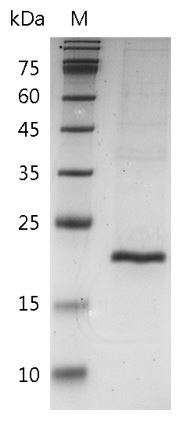| Product name | Mouse TNF beta Protein, His tag (Animal-Free) |
| Sequence | Amino acid sequence derived from Mouse TNF beta (Leu 34-Leu 202) (P09225) was expressed with 6×His tag at the N-terminus |
| Applications | His tag |
| Applications notes | Mouse |
| Activity | Measured by its ability to induce cytotoxicity in L929 cells in the presence of vactinomycin D.The ED50 for this effect is <30 ng/mL |
| Protein length | The recombinant Mouse TNF beta consists of 169 amino acids and predicts a molecular mass of 19.36 kDa |
| Preparation method | E. coli |
| Purity | >98% as determined by SDS-PAGE. |
| Alternative | TNFSF1B, Lymphotoxin-alpha (LT-α), LTalpha, Ltx, TNF-be, TNFSF1, Tnf, Tnfb, Tnfsf, Tnfsf1b, Tnlg1e, hlb38, hlb382, lymph |
| Formulation | Lyophilized from PBS, pH 8.0 |
| Features & Benefits | Endotoxin: <0.1 EU per 1 μg of the protein by the LAL method. |
| Molecular weight | 19.36 kDa |
| Usage notes | Always centrifuge tubes before opening. It is recommended to reconstitute the lyophilized recombinant protein to a concentration of 0.1-1 mg/mL using the buffer we provided, and keep at room temperature for at least 20 min to fully dissolve. Please avoid vortex vigorously. |
| Storage instructions | Lyophilized protein product should be stored desiccated below -18°C. Upon reconstitution, the protein should be stored at 4°C between 2-7 days and for future use below -18°C. For long term storage it is recommended to add a carrier protein (5% HSA , 10%FBS or 0.1%BSA). Please prevent freeze-thaw cycles |
| Shipping | Gel pack with blue ice. |
| Precautions | The product listed herein is for research use only and is not intended for use in human or clinical diagnosis. Suggested applications of our products are not recommendations to use our products in violation of any patent or as a license. We cannot be responsible for patent infringements or other violations that may occur with the use of this product. |
| Background | Tumor Necrosis Factor (TNF) is a member of the Tumor Necrosis Factor family. TNF exists as a homotrimer and interacts with SPPL2B. TNF is mainly secreted by macrophages and can induce cell death of certain tumor cell lines. TNF is a key cytokine in the development of several inflammatory disorders. It contributes to the development of type 2 diabetes throught its effects on insulin resistance and fatty acid metabolism |
| Alternative | TNFSF1B, Lymphotoxin-alpha (LT-α), LTalpha, Ltx, TNF-be, TNFSF1, Tnf, Tnfb, Tnfsf, Tnfsf1b, Tnlg1e, hlb38, hlb382, lymph |
| Accession | P09225 |

You must be logged in to post a review.
Reviews
There are no reviews yet.